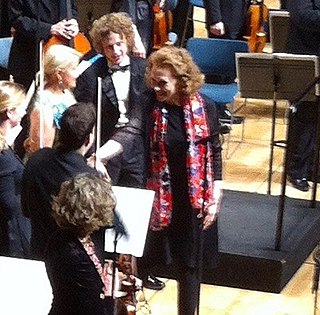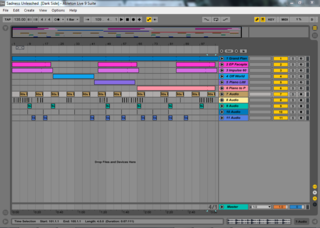
In music, an arrangement is a musical adaptation of an existing composition. Differences from the original composition may include reharmonization, melodic paraphrasing, orchestration, or formal development. Arranging differs from orchestration in that the latter process is limited to the assignment of notes to instruments for performance by an orchestra, concert band, or other musical ensemble. Arranging "involves adding compositional techniques, such as new thematic material for introductions, transitions, or modulations, and endings. Arranging is the art of giving an existing melody musical variety". In jazz, a memorized (unwritten) arrangement of a new or pre-existing composition is known as a head arrangement.
Computer music is the application of computing technology in music composition, to help human composers create new music or to have computers independently create music, such as with algorithmic composition programs. It includes the theory and application of new and existing computer software technologies and basic aspects of music, such as sound synthesis, digital signal processing, sound design, sonic diffusion, acoustics, electrical engineering and psychoacoustics. The field of computer music can trace its roots back to the origins of electronic music, and the first experiments and innovations with electronic instruments at the turn of the 20th century.
Electronic music is a genre of music that employs electronic musical instruments, digital instruments, or circuitry-based music technology in its creation. It includes both music made using electronic and electromechanical means. Pure electronic instruments depended entirely on circuitry-based sound generation, for instance using devices such as an electronic oscillator, theremin, or synthesizer. Electromechanical instruments can have mechanical parts such as strings, hammers, and electric elements including magnetic pickups, power amplifiers and loudspeakers. Such electromechanical devices include the telharmonium, Hammond organ, electric piano and the electric guitar.

An electronic musical instrument or electrophone is a musical instrument that produces sound using electronic circuitry. Such an instrument sounds by outputting an electrical, electronic or digital audio signal that ultimately is plugged into a power amplifier which drives a loudspeaker, creating the sound heard by the performer and listener.
Musique concrète is a type of music composition that utilizes recorded sounds as raw material. Sounds are often modified through the application of audio signal processing and tape music techniques, and may be assembled into a form of sound collage. It can feature sounds derived from recordings of musical instruments, the human voice, and the natural environment as well as those created using sound synthesis and computer-based digital signal processing. Compositions in this idiom are not restricted to the normal musical rules of melody, harmony, rhythm, metre, and so on. The technique exploits acousmatic sound, such that sound identities can often be intentionally obscured or appear unconnected to their source cause.

Robert Arthur Moog was an American engineer and electronic music pioneer. He was the founder of the synthesizer manufacturer Moog Music and the inventor of the first commercial synthesizer, the Moog synthesizer, which debuted in 1964. In 1970, Moog released a more portable model, the Minimoog, described as the most famous and influential synthesizer in history. Among Moog's honors are a Technical Grammy Award, received in 2002, and an induction into the National Inventors Hall of Fame.

Orchestration is the study or practice of writing music for an orchestra or of adapting music composed for another medium for an orchestra. Also called "instrumentation", orchestration is the assignment of different instruments to play the different parts of a musical work. For example, a work for solo piano could be adapted and orchestrated so that an orchestra could perform the piece, or a concert band piece could be orchestrated for a symphony orchestra.

Jonathan Richard Guy Greenwood is an English musician and composer. He is the lead guitarist and keyboardist of the alternative rock band Radiohead, and has written numerous film scores.

Kaija Anneli Saariaho is a Finnish composer based in Paris, France. During the course of her career, Saariaho has received commissions from the Lincoln Center for the Kronos Quartet and from IRCAM for the Ensemble Intercontemporain, the BBC, the New York Philharmonic, the Salzburg Music Festival, the Théâtre du Châtelet in Paris, and the Finnish National Opera, among others. In a 2019 composers' poll by BBC Music Magazine, Saariaho was ranked the greatest living composer.

Ableton Live, also known as simply Ableton, is a digital audio workstation for macOS and Windows developed by the German company Ableton. In contrast to many other software sequencers, Ableton Live is designed to be an instrument for live performances as well as a tool for composing, recording, arranging, mixing, and mastering. It is also used by DJs, as it offers a suite of controls for beatmatching, crossfading, and other different effects used by turntablists, and was one of the first music applications to automatically beatmatch songs. Live is available directly from Ableton in three editions: Intro, Standard, and Suite. Ableton also make a fourth version, Lite, with similar limitations to Intro. It is only available bundled with a range of music production hardware, including MIDI controllers and audio interfaces.

Yann Tiersen is a French Breton musician and composer. His musical career is split between studio recordings, music collaborations and film soundtracks songwriting. His music incorporates a large variety of classical and contemporary instruments, primarily the electric guitar, the piano, synthesisers and the violin, but also instruments such as the melodica, xylophone, toy piano, harpsichord, piano accordion or even typewriter.

Georges Lentz is a contemporary composer and sound artist, born in Luxembourg in 1965 and that country's internationally best known composer. Since 1990, he has been living in Sydney, Australia. Despite his relatively small output and his reclusiveness, he is also considered one of Australia's leading composers. His music is inspired by the starry night sky in the Australian Outback and by Aboriginal art.

Timothy "Tim" George Hodgkinson is an English experimental music composer and performer, principally on reeds, lap steel guitar, and keyboards. He first became known as one of the core members of the British avant-rock group Henry Cow, which he formed with Fred Frith in 1968. After the demise of Henry Cow, he participated in numerous bands and projects, eventually concentrating on composing contemporary music and performing as an improviser.

The Moog synthesizer is a modular synthesizer developed by the American engineer Robert Moog. Moog debuted it in 1964, and Moog's company R. A. Moog Co. produced numerous models from 1965 to 1981, and again from 2014. It was the first commercial synthesizer, and is credited with creating the analog synthesizer as it is known today.
The Doctor Who theme music is a piece of music written by Australian composer Ron Grainer and realised by Delia Derbyshire at the BBC Radiophonic Workshop. Created in 1963, it was one of the first electronic music signature tunes for television. It is used as the theme for the science fiction programme Doctor Who, and has been adapted and covered many times.

An experimental musical instrument is a musical instrument that modifies or extends an existing instrument or class of instruments, or defines or creates a new class of instrument. Some are created through simple modifications, such as cracked drum cymbals or metal objects inserted between piano strings in a prepared piano. Some experimental instruments are created from household items like a homemade mute for brass instruments such as bathtub plugs. Other experimental instruments are created from electronic spare parts, or by mixing acoustic instruments with electric components.
Edward Cowie is an English composer, author, natural scientist, and painter.

A synthesizer is an electronic musical instrument that generates audio signals. Synthesizers typically create sounds by generating waveforms through methods including subtractive synthesis, additive synthesis and frequency modulation synthesis. These sounds may be altered by components such as filters, which cut or boost frequencies; envelopes, which control articulation, or how notes begin and end; and low-frequency oscillators, which modulate parameters such as pitch, volume, or filter characteristics affecting timbre. Synthesizers are typically played with keyboards or controlled by sequencers, software or other instruments, and may be synchronized to other equipment via MIDI.
The Mortal Instruments: City of Bones is a 2013 urban fantasy film based on the first book of The Mortal Instruments series by Cassandra Clare, directed by Harald Zwart, with a script written by Jessica Postigo. The film stars Lily Collins, Jamie Campbell Bower, Robert Sheehan, Kevin Zegers, Lena Headey, Kevin Durand, Aidan Turner, Jemima West, Godfrey Gao, C. C. H. Pounder, Jared Harris, and Jonathan Rhys Meyers. The musical score was composed by Icelandic composer Atli Örvarsson. The film featured two soundtracks: an original soundtrack and an original score. Both the albums were released on August 20, 2013, a day before the film's release. The original soundtrack, released by Republic Records, featured songs performed by Ariana Grande, Zedd, Demi Lovato, Colbie Caillat, AFI, Nathan Sykes amongst several others. Two original songs were also recorded for the film. The score album, published by Milan Records, featured the musical cues from Örvarsson's score.

A string synthesizer or string machine is a specialized synthesizer designed specifically to make sounds similar to that of a string orchestra. Dedicated string synthesizers occupied a specific musical instrument niche between electronic organs and general-purpose synthesizers in the 1970s and early 1980s, until advances in digital signal processing technology allowed the production of inexpensive general-purpose polyphonic synthesizers and samplers, which made the existence of a separate type of instrument unnecessary.












